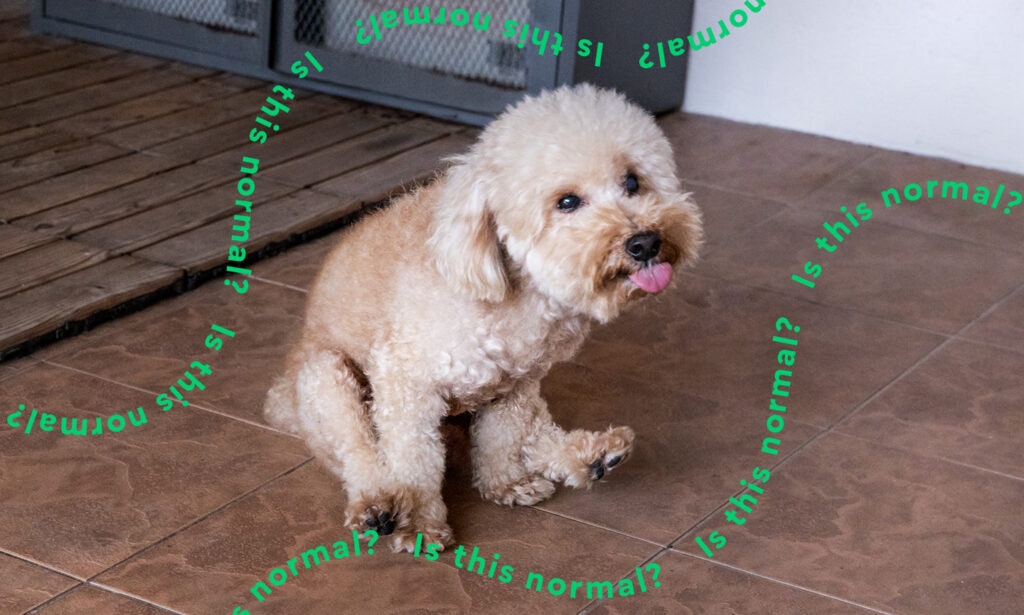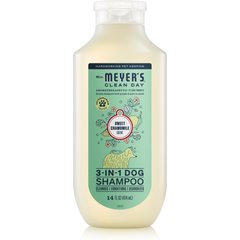Why Do Dogs Drag Their Butts on the Floor? Is This Normal?

Photo by Chewy
Q: Sometimes my dog will start scooting their butt across the floor out of nowhere, as if they’re trying to itch a scratch they can’t reach! I’m not sure if it’s just a silly quirk or if they need some medical attention. Is a dog dragging their butt normal?
A: It’s fairly common to catch a dog scooting their butt across the floor, and while it might look funny, it’s usually a sign of discomfort. Scooting is often caused by skin irritation, leftover fecal matter, or pressure from the anal glands. While any dog can exhibit this behavior, it’s particularly common among smaller or stockier breeds, like Chihuahuas or Pugs.
To learn more about why dogs drag their butts and how to help, we spoke with a canine behavior expert and a veterinarian who shared what pet parents need to know.
Key Takeaways
- Butt scooting can happen occasionally, no matter your dog’s age or breed.
- Some dogs are more likely to scoot their butts, including tiny dogs, pups with stocky builds, and canines with long fur.
- Common causes of dog butt scooting include anal gland impaction, skin irritation, fecal debris, and intestinal parasites.
- You can treat rare or occasional dog butt scooting at home with dog-safe wipes, but frequent scooting requires a vet visit.
Why Do Dogs Drag Their Butt on the Floor?
Dogs scooting their butts on the floor can happen in any dog. However, it’s especially common among:
- Stocky breeds like Pugs and Bulldogs
- Smaller dogs like Chihuahuas and Dachshunds
- Long-haired breeds
They scoot their butts for a few different reasons.
They Have An Anal Gland Problem
All dogs have two small glands just inside their anus that can become full, blocked, or infected, says Holly Dutton, DVM, medical director and emergency veterinarian at VEG ER for Pets in Tampa, Florida.
“While any dog can scoot, small breeds, like Chihuahuas, Dachshunds, and Toy Poodles, are more prone because their anal glands can become impacted more easily,” she says.
In these cases, butt scooting is an instinctive way for dogs to self-soothe and relieve discomfort.
Their Skin Is Irritated
“Allergies, dryness, or grooming product residue can make the area itchy,” says certified dog behaviorist Erin Askeland, CPDT-KA, CBCC-KA, owner of For the Love of Snouts in the Atlanta, Georgia area.
Scooting is their way to scratch that itch. This behavior is especially common in dogs with stocky builds or those who are overweight due to the extra skin folds that can trap irritants.
They Have Fecal Debris or Matted Fur
Long-haired dogs are more likely to get fecal debris stuck in the fur around their butt, leading to irritation. The fur can also become matted, which is irritating with or without poop.
“They may scoot to clean themselves if something is stuck,” Askeland says.
They’ve Picked Up Intestinal Parasites
Dr. Dutton says certain intestinal parasites, such as tapeworms, can cause itchiness and discomfort around the anus. Parasites can prompt dogs to scoot in an attempt to relieve the irritation.
Additionally, other parasites like fleas can contribute to general itchiness and scooting.
They Are Scooting Out Of Habit
In some cases, dogs may continue scooting out of habit.
This can happen even after the initial irritation has resolved, “because they learned it provides temporary relief,” Askeland says.
What Should I Do About My Dog’s Butt Scooting?
If you notice your dog scooting their butt—even just once or twice—it likely means they’re experiencing some irritation and need your help.
- For occasional scooting, Dr. Dutton recommends checking the area and gently cleaning it with a dog-safe wipe, like the Earth Rated Hypoallergenic Dog Grooming Wipes. Inspect the area for any debris and remove it carefully. If you notice any signs of parasites, go to the vet right away.
Recommended Product
- For frequent scooting, or if you notice swelling, a foul odor, pus, or blood, Dr. Dutton says it’s time to skip at-home treatment and see your vet. These symptoms could signal anal gland problems, intestinal parasites, an abscess, or a skin infection—all of which require prompt veterinary care.
No matter the cause, keeping your dog’s rear area clean is key to preventing scooting in the first place.
“Regular bathing of the rear area, especially in long-coated dogs, can reduce irritation,” Askeland says. “Unscented pet wipes, gentle dog-safe shampoos, or sanitary trims for long-haired dogs can reduce some causes of scooting.”
Try Burt’s Bees Oatmeal with Colloidal Oat Flour & Honey Dog Shampoo or Mrs. Meyer’s 3-in-1 Dog Shampoo, Sweet Chamomile.
Recommended Products
FAQs About Dogs Scooting Their Butt
When should I take my dog to the vet for scooting?
Take your dog to the vet if they’re frequently scooting their butt, or if you notice swelling, blood, pus, or a foul odor. These signs may indicate a blocked anal gland, an abscess, parasites, or a skin infection.
Does dog scooting go away on its own?
Sometimes, dogs can relieve minor irritation or remove debris on their own. But in most cases, they need help from you—or your vet—especially if there’s an underlying issue like an infection, abscess, or parasites.
Is there a home remedy for dog scooting?
Start by gently cleaning your dog’s rear with a pet-safe wipe, such as Earth Rated Hypoallergenic Dog Grooming Wipes. This can resolve minor, occasional scooting.
For all other scenarios, contact your vet.
Can grooming help stop dog scooting?
Yes, it can, especially in stocky breeds with folded skin or dogs with long fur. Keeping the fur around their rear trimmed helps reduce matting and buildup.
Routine grooming helps reduce irritation. But if your dog already has a blockage or infection, they’ll need veterinary care.
What breeds are more prone to anal gland problems?
Small breeds, such as Chihuahuas, Dachshunds, and Toy Poodles, are susceptible to anal gland issues. Their smaller size makes gland impaction more likely, and scooting is often their way of seeking relief.
Should my dog be scooting after their anal glands are expressed?
A little scooting after anal gland expression can be normal, especially if there’s mild irritation or leftover fluid. However, if the behavior continues, it could mean there’s still discomfort or a lingering issue that needs attention from your vet.






